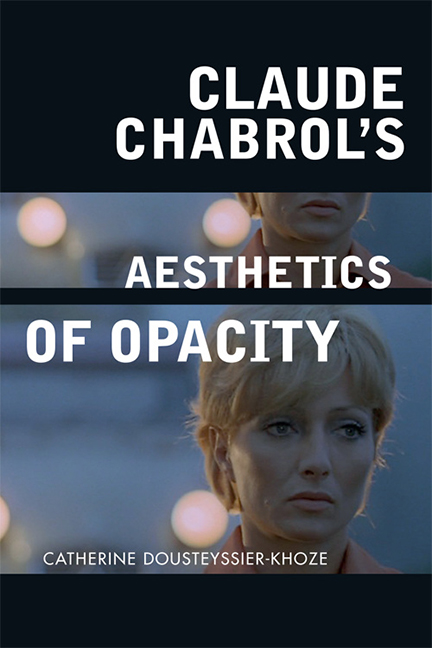Book contents
- Frontmatter
- Contents
- List of Figures
- Acknowledgements
- Dedication
- Introduction
- 1 Contexts and Influences
- 2 Chabrol and Genres
- 3 The Human Beast
- 4 Family Secrets
- 5 Chabrolean Spaces as Heterotopias of Crisis
- 6 Through the Looking Glass: Chabrol’s Mirrors and the ‘Crystal-image’
- Conclusion: Towards an Aesthetics of Visual Opacity
- Filmography
- Bibliography
- Index
4 - Family Secrets
Published online by Cambridge University Press: 10 November 2020
- Frontmatter
- Contents
- List of Figures
- Acknowledgements
- Dedication
- Introduction
- 1 Contexts and Influences
- 2 Chabrol and Genres
- 3 The Human Beast
- 4 Family Secrets
- 5 Chabrolean Spaces as Heterotopias of Crisis
- 6 Through the Looking Glass: Chabrol’s Mirrors and the ‘Crystal-image’
- Conclusion: Towards an Aesthetics of Visual Opacity
- Filmography
- Bibliography
- Index
Summary
The family becomes the focus of intense investigation and dislocation in Chabrol's films, whether it be in thrillers or melodramas. Chabrol seems to have adopted Tolstoy's famous opening sentence: ‘Happy families are all alike; every unhappy family is unhappy in its own way.’ There are very few happy families in Chabrol's world and they often do not end well (La Cérémonie). The murderer or monster is almost always a family member (Au coeur du mensonge) or in the wider sense a well-integrated member of the community (Le Boucher), and much more rarely an outsider (La Cérémonie). This chapter will explore Chabrol's bleak and complex depiction of the family through the following key issues: incest, the couple, family rituals, and the role of the patriarch.
Incest
Incest is the dark secret that is often to be found at the heart of Chabrol's cinema, ranging from Violette Nozière to Blood Relatives and La Fleur du mal. Although underlying, it is already (omni)present in his first feature, Le Beau Serge, through the character of Glomaud. This old peasant (interpreted by Edmond Beauchamp) rapes his (step)daughter Marie and it is implied that he may be the father of his daughter Yvonne's stillborn, disabled baby. Incest could then be a determining factor that accounts for Serge's unhappiness and drinking habit and it also used to emphasise the bestiality of the countryside mores as part of a Naturalist (in a Zolian sense, in an echo of La Terre) or neorealist anchoring that characterises a large segment of the film.
For Chabrol, evil often comes from within (the family) rather than from the outside. As he said, in relation to Blood Relatives:
What's frightening is that there's a father, a mother, and children – they are all pressed together – it's disgusting … I don't see how people can live that way – and yet it has such strength. It's masochistic; they are unhappy but it endures.
Incestuous relationships are sometimes only suggested: incest becomes a possible interpretation and Chabrol, skilfully, and rather perversely, leaves it to the audience to decide one way or the other. This is the case in L‘Ivresse du pouvoir, where Jeanne/Isabelle Huppert and her nephew (played by Thomas Chabrol) seem to enjoy a closer and warmer relationship than the one she has with her husband.
- Type
- Chapter
- Information
- Claude Chabrol's Aesthetics of Opacity , pp. 104 - 117Publisher: Edinburgh University PressPrint publication year: 2017



